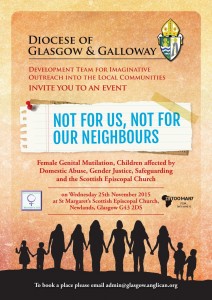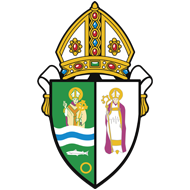IOILC event held on 25th November 2015
The title of the event was derived from the commandment to love our neighbours. Love of God and love of neighbour are fundamental to Christianity, however, love is not unique to Christianity, as love is also central and nurtured by other religions, humanist, secular organisations and individuals. The story of the Good Samaritan establishes a moral obligation for Christians to become neighbours to those in any kind of need; those living in poverty, children, refugees, homeless, trafficked, violated and also enemies. The Good Samaritan also illustrates that the focus on love calls for concrete action.
The challenge of loving our neighbours as ourselves means that any set of circumstances that we do not want for ourselves calls us to do what we can to ensure our neighbours, nearby and global are freed and protected from the said circumstances.
The importance of ensuring any action is in accordance and directed by our neighbours is essential. For this to happen there is a need to be willing to listen, to learn, to share and to proffer all power to God’s transformative and creative love.
The event’s aim was to have delegates leaving informed and inspired to do what they can to reduce Female Genital Mutilation (FGM), Domestic Abuse, promote Gender Justice and to recognise and to be part of the role the church fulfils in protection and bringing the issues to God’s unconditional love.
The Contributors to the event were:-
Bishop of Glasgow & Galloway – Rt Rev Dr Gregor Duncan – Welcome and Final Prayers
Rev Val Nellist – Convenor Overseas committee – Chair
Irene Crawford – Chair of 28toomany – a charity involved in the fight against FGM by providing research and training across the 28 countries in Africa which still carry out the practice. Irene witnessed some of the trauma which accompanies FGM during her time in Tanzania and Uganda.
Claire Jolly – Service Manager at East Dunbartonshire Women’s Aid works with children and young people affected by domestic abuse. Claire is passionate about working with children and young people to ensure that they understand that what happened was not their fault; promote awareness of safety and having a voice in the processes that affect them.
Elspeth Davey – Church Relations Officer – Elspeth reported on the Latin American Symposium for Faith Leaders and Organisations for Gender Justice which incorporated SidebyediS: the Faith Movement for Gender Justice which was held in Sau Paul, Brazil.
Donald Urquhart – Provincial Officer for the Protection of Children – Donald assists congregations across Scotland to the make the Church and the Church communities safe places for everyone, in particular, those who are vulnerable.
Thanks are offered to the contributors, Paul Hindle for IT support and to Jan MacDonald and her team for supplying lunch and hospitality. Thanks also go to Liz and Lesley for bringing products which promoted Fair Trade and Mothers’ Union.
Following the event the team received feedback:-
‘I am glad that I was able to come to the meeting on Thursday. All the speakers were good. I would have liked more information about how much awareness of FGM there is in Glasgow so I will try and follow up what is happening in Edinburgh. I already get regular Link letters from 28 too many’.
‘I found the material covered on the day really useful and I have already been in discussion with Claire Jolly to obtain some of her material for my own use’.
‘Could you pass on my thanks to all those who were involved in the organisation of the event today. I found it very interesting and informative’.
‘Just to thank you for the opportunity to attend the seminar today. Sadly I had to leave early due to another commitment. I was really distressed to hear the experiences and be confronted with the global challenge. A very useful and informative day. There may be an opportunity to offer some CPD day workshops with 28toomany for members of school senior management teams responsible for safeguarding’.
‘Thanks for the recent conference. Every one of the speakers was excellent and I was so pleased I didn’t miss such a though provoking, heart breaking challenging day. Thank you’.
For information please visit websites below
www.28toomany www.edwa.org.uk and www.scotland.anglican.org
Further information
FEMALE GENITAL MUTILATION
28toomany is a charity involved in the fight against FEMALE GENITAL MUTILATION (FGM). The charity provides research and training across the 28 countries in Africa which still carry out the practice.
FGM is internationally recognised as a violation of the fundamental rights of women and girls (WHO) 2014). The violence inflicted has long term physical and psychological impact on girls and women.
FGM refers to ‘all procedures involving partial or total removal of the female external genitalia or other injury to the female genital organs for non-medical reasons – there are 4 types (WHO 2014).
UNICEF estimates that more than 125 million women and girls in 29 countries around the world are affected by FGM with some 83 million survivors in Egypt, Ethiopia, Nigeria and Sudan alone. The highest prevalence rate is found in Somalia (98%), Guinea (96%), Djibouti (93%) and Egypt (91%). In 50% of practising countries girls undergo FGM before the age of 5years, while in the other countries the age is between 5-14 years (UNICEF 2013).
Communities potentially affected by FGM in Scotland
The African population in Scotland has increased from 5,000 in 2001 to 30,000 in 2011 (Census data)
FGM has been illegal in Scotland since the introduction of the Prohibition of Female Genital Mutilation Scotland Act 2005. (UK 1985).
A total of 23,979 men, women and children were born in one of the 29 countries identified by UNICEG (2013) as an ‘FGM-practising country’ living in Scotland in 2011. The largest community potentially affected by FGM living in Scotland are Nigerians, with 9,458 people resident in Scotland who were born in Nigeria, followed by Somalia, Egypt, Kenya, Sudan and Eritrea. There are potentially affected communities living in every local authority are in Scotland, particularly in Glasgow, Aberdeen, Edinburgh and Dundee. In the last decade there has been a fivefold increase in girls born to mothers born in an FGM-practising country.
Raising awareness, education and support are key elements in the reduction of the practice of FGM.
For more information please see www.28toomany and Tackling Female Genital Mutilation in Scotland (Scottish Refugee Council 2014) available at www.scottishrefugeecouncil.org.uk
Support Needs of Children who experience Domestic Abuse (SWA)
INFORMATION BRIEFING – NO. 3 The impact of domestic abuse on children and young people Introduction
The body of literature on the impact of domestic abuse on children has grown rapidly in the last three decades. The wealth of research on this topic has led to a general consensus that exposure to domestic abuse has negative consequences for children. Child development research has found that children exposed to domestic abuse are more likely to have adjustment problems than other children without exposure. Less clear is the extent of its impact and why impact can vary from child to child, with variation even occurring amongst children in the same family. The effects of domestic abuse Although many mothers make strenuous efforts to protect children from domestic abuse, research tells us that children are often very aware of and at times involved in the abuse (see Scottish Women’s Aid ‘How children and young people are affected by domestic abuse for further information). Because domestic abuse does not always stop when parents separate, children may have to move house several times in order to flee from the perpetrator. These repeated upheavals are characterised by disruptions to their education and social activities, as well as a loss of friends, family members and belongings. Children can experience a range of short-term and or long-term effects. These effects are overlapping but can be broadly categorised as being physical, social, emotional, and behavioural.
Staff help by ensuring: children know that they are not at fault, help provide an opportunity for children to share what they wish, usually a variety of mediums, help children develop strategies to increase their safety and their confidence.
Staff provide opportunities for children to meet together to have fun.
Gender Justice
25th of November is the United Nations International Day for the Elimination of violence against women.
The SEC is represented each year at the Commission on the Status of Women and as part of the global partnerships the SEC speaks out for Gender Justice.
Life Abundant for all God’s people – A Gender Based violence Bible Study
Gender Based Violence – An International Perspective
For more information please visit websites below
www.28toomany www.edwa.org.uk and www.scotland.anglican.org
The team hope the above information is of help.
Convenor l9/1/2016



